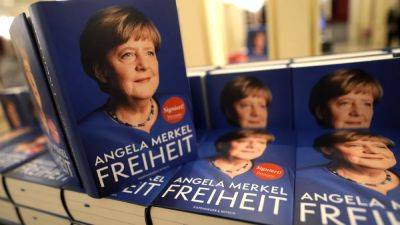Merkel confronts her legacy in long-awaited memoir
After Donald Trump's election to the White House in 2016, then-German Chancellor Angela Merkel gave a speech pushing for unity for which she was labelled the “leader of the free world.”
This general sense of respect followed the former German Chancellor when she left office in 2021 relatively popular both at home and abroad. Merkel steered Germany through multiple seismic events including the financial crisis, the 2015 migrant crisis and Russia’s annexation of Crimea in 2014.
Her first-ever memoir, released on Tuesday, finds the former chancellor both justifying and regretting decisions she made in power, expressing concern for the current state of the world and its future.
Merkel has come under criticism, particularly in Ukraine, for her approach towards Russia during her time in office. She is particularly blamed for encouraging Russia's aggression by being too soft on the country as well as Germany's reliance on cheap Russian gas.
The former German leader has denied that her decisions would have prevented Russia’s full-scale invasion in 2022, after she left office. Merkel points to a key summit in 2008 on Ukraine’s NATO accession talks, in which she blocked Kyiv's pathway to NATO membership.
She said she is convinced allowing Ukraine to join NATO earlier would have only provoked Russian President Vladimir Putin earlier, who used Ukraine's NATO accession as justification for his full-scale invasion of Ukraine, and that she "wouldn't apologise" for her stance on Russia during her tenure.
Journalist and author of a previous biography of Angela Merkel, "Die Kanzlerin", Ursula Weidenfeld said that the former leader was driven by pragmatism above all else.
"As far as Russia is concerned, the crisis has only just begun.








